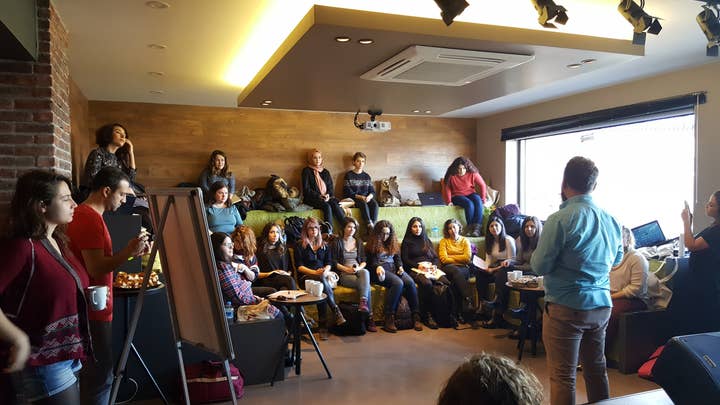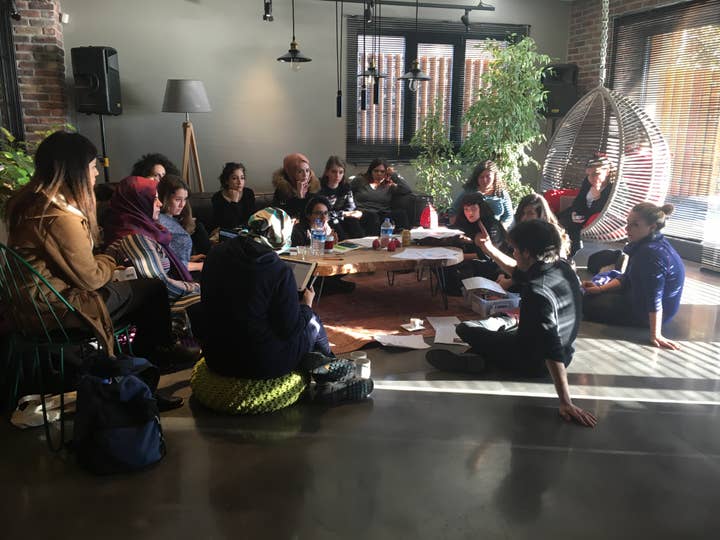“No region or city is free of the games industry's gender disparity”
Gram Games calls on companies around the world to push for better diversity, just as it's doing with The 22% Project
It's no secret the games industry has something of a gender issue.
Almost any survey into the workforce creating and publishing games around the world reveals that this is undoubtedly a male-dominated business, despite the rising number of female players enjoying the end products. This is, of course, not an issue exclusive to video games but is something many firms are keen to address.
One such firm is Gram Games, the developer behind mobile hits such as 1010, Merged and Six. Back in January, the company launched a series of workshops designed to encourage women to explore a career in games - an initiative entitled The 22% Project. First held in Gram's home city of Istanbul, the workshops are being recreated this weekend at its new London HQ.

The studio's culture developer Erin O'Brien tells GamesIndustry.biz why Gram feels such a project is necessary.
"Gender discrepancy is an issue in most industries, but it is particularly prominent within the games industry," she says. "We were aware of the issue, but when we came across the IGDA 2015 Developer Satisfaction Survey, we were particularly disappointed. The survey stated that while over half of gamers are women, just 22% of the gaming industry is female. We wanted to do our part to counteract this."
She adds that the "most unnerving part" is that this statistic has only doubled since 2009, when the amount of women in the industry was just 11%. O'Brien believes we should be aiming for no less than 50%, and a lot sooner than the next eight years.
However, more industry support is needed. O'Brien is quick to stress this is not just a call for other companies to take part in The 22% Project, but a plea for them to run their own initiatives that help push the same message.
"The only way issues as large as industry-wide gender disparity are going to be addressed is through industry-wide effort"
"We don't want this to simply be a 'Gram' project," she says. "The only way issues as large as industry-wide gender disparity are going to be addressed is through industry-wide effort. We would love to see even more studios start initiatives like ours. We are also keen to reach out and see how they might get involved with The 22% Project."
Fighting the lack of diversity in the games industry will come down to more than just the occasional workshop or summit, O'Brien continues. Companies need to actively show they are combatting such biases in order to establish video games as a business in which women "don't feel stifled, limited, judged or discriminated against."
"Internal education, workshops, reskilling and so on are critical to attract, support and retain women in the gaming industry," she says. "This wider industry needs to understand the importance of having equal female representation when half of gamers - i.e. half of their customer base - are women. Additionally, organisations need to take the time not only to recognise, but address, the fact that deep seated biases and misogynistic tendencies are often present throughout industries, particularly in games and the gaming industry, and take actions to mitigate their presence."

There are many ways to accomplish this, but one the Gram Games exec suggests is identifying and promoting new role models. If 22% of industry members are women already established in key roles, celebrating them and their accomplishments can help encourage more to follow in their footsteps.
O'Brien says: "In highlighting successful, influential women in the gaming industry, we want to demonstrate that there is a highly valuable path for women in this industry, and that with the right education and the resource, success is attainable."
There are more than just moral reasons why the industry should be pushing for better diversity. With such a high number of female players, a more representative workforce will help better cater to their needs and tastes.
"It's been shown that the male dominance of video game playing has been disproven," O'Brien says. "Female representation in teams should match the demographic of their customer base.
"It has been repeatedly shown that having more women on a team not only increases creativity, but can actually be more profitable"
"And it has been repeatedly shown that having more women on a team not only increases creativity, but can actually be more profitable - a business imperative - in the long run."
Reaching out to women who are already considering a role in video games is not enough. The biases that deter younger girls from exploring such a career path are actually affecting the potential talent pool at "a grassroots, educational level".
"Due to deeply rooted socio-cultural bias, women at a young age can be encouraged away from technical or scientific fields, which is a travesty," says O'Brien.
"As women grow older and start looking for careers, those deeply rooted biases can encourage them away from gaming towards other industries. Also, throughout their educational career path, they might not seek out the admittedly very niche or esoteric skills necessary for success in the gaming sector. So it's a confluence of factors - all of which can begin to be addressed by providing young women with the resources necessary to counter these biases.
"Other companies can start by ensuring women in the industry and those within their own organisations receive ample support, education and the necessary resources to succeed in the gaming industry. Employees within the organisation should also receive education about the necessity of gender parity within any industry. This is not just as a moral imperative, but as a business one. Women are half of the talent pool - it is an unwise business decision to not take advantage of that."

Following the success of The 22% Project's first round of workshops, the London-based event will follow much the same structure. The objective is not just to recruit women, but to raise awareness of the possibilities our industry holds, and workshops aren't the only way to accomplish this.
"The issue of gender parity is one that requires full industry support and effort. Conferences are a great way to create the kind of visibility"
"We think education is imperative to help women break into the gaming industry," O'Brien says. "I think the pedagogical format of a workshop or conference is effective. They can provide women with the necessary resource, skill and information to break into the industry. Additionally, the issue of gender parity is one that requires full industry support and effort. Conferences are a great way to create the kind of visibility.
"The skills necessary for success in the gaming industry can be, as previously stated, quite specific or even esoteric. Many of these skills are not ones that would be automatically learned in a generic educational environment. We want to provide a space where these skills can be learned, so that, in the long run, women can be competitive for games industry careers.
"While we encourage women at all levels of the career path - be it student or mid-career professionals - we've found the women who show the most interest in The 22% Project are those at the university level. This is a particularly effective point at which to provide this kind of education and resources because many of these women haven't yet necessarily determined a specific career path - they might have an idea, or a particular interest, but they're not cemented into anything.
"For young women who are interested in gaming, but who might not know how to make the transition from university to the gaming industry, providing education and resources in the form of The 22% Project can be particularly effective and formative."
Having started in Istanbul, Gram's workshops are now moving to London but O'Brien is keen to see similar events held on a global scale, stressing that addressing the issue of diversity has become "necessary around the world."
"No region or city is completely free of these gender biases, or of the gender disparity of the gaming industry"
"No region or city is completely free of these gender biases, or of the gender disparity of the gaming industry," she says. "It needs to be demonstrated that this isn't an issue that is limited to Istanbul, or to anywhere else. It's an issue that permeates everywhere.
"We want women in London to benefit from these workshops in the same way women in Istanbul did, as they are facing many of the very same issues."
And it's not just the gender imbalance that needs to be addressed. There are other demographics this model - or initiatives similar to it - can be used to reach, fighting any kind of disparity and improving the diversity of the industry in multiple ways.
"Women are not the only group that are discriminated against on a societal level, and thus face biases when trying to enter an industry like gaming," O'Brien says. "Providing groups that have fought against bias with education and resources to mitigate the negative effect of those biases is critical, and always a benefit.
"Additionally, just as with women, and deeply rooted tendencies within industries, it is always productive to provide internal education to identify and address language, practices, behaviours, or systems that might implicitly or explicitly be working against or discriminating against a certain group. Awareness is key in trying to address any issue."
If you're interested in attending this weekend's 22% Project workshops, you can register here.
